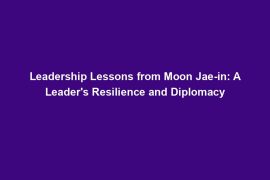Hey there, curious minds! Today, we’re diving into the fascinating world of leadership lessons from historical figures, starting with the incredible Kim Dae-jung.
Kim Dae-jung was a prominent leader in South Korea, known for his strong diplomatic skills and unwavering courage in the face of adversity. Studying the leadership strategies of figures like Kim Dae-jung can provide valuable insights that we can apply to our own lives and careers.
In this blog post, we’ll explore Kim Dae-jung’s approach to international relations, his diplomatic achievements, and the key strategies and tactics he used during his presidency. We’ll also discuss the importance of effective diplomacy in leadership, and how we can learn from Kim Dae-jung’s success in this area.
But that’s not all! We’ll also delve into Kim Dae-jung’s resilience in the face of political persecution and imprisonment, analyzing how his courage influenced his leadership style. We’ll talk about the significance of courage in leadership, and the valuable lessons we can learn from Kim Dae-jung’s legacy.
So, buckle up and get ready to be inspired! By the end of this post, you’ll have a deeper understanding of Kim Dae-jung’s leadership legacy, and hopefully, some valuable takeaways to apply to your own leadership journey. Let’s get started!
Diplomacy: Kim Dae-jung’s Approach to International Relations
When it comes to leadership, one of the key traits that can make a leader stand out is their ability to navigate the complex world of international relations. Kim Dae-jung, the former president of South Korea, was a master in this arena. During his time in office, he made significant strides in improving relations with other countries, particularly with North Korea.
Kim Dae-jung was known for his Sunshine Policy towards North Korea, which aimed to foster reconciliation and cooperation between the two Koreas. This approach led to the historic inter-Korean summit in 2000, where Kim Dae-jung met with North Korean leader Kim Jong-il. This event was a major breakthrough in the long-standing conflict between the two countries.
Key Strategies and Tactics
Kim Dae-jung used a variety of strategies and tactics to achieve his diplomatic goals. One of the most notable tactics was his willingness to engage in dialogue, even in the face of strong opposition. He understood the power of communication in building trust and resolving conflicts.
Another key strategy that Kim Dae-jung employed was his ability to see the bigger picture. He understood that sometimes short-term sacrifices were necessary for long-term gains. This kind of strategic thinking allowed him to make bold decisions that ultimately benefited his country.
Importance of Effective Diplomacy
Effective diplomacy is essential for any leader, especially in today’s interconnected world. Leaders who can build strong relationships with other countries can open up opportunities for economic growth, security, and peace. By studying Kim Dae-jung’s approach to international relations, we can learn valuable lessons on how to navigate the complexities of diplomacy with grace and effectiveness.
So, the next time you find yourself in a challenging situation that requires diplomatic finesse, think of Kim Dae-jung and remember the power of communication, strategic thinking, and the courage to pursue bold decisions for the greater good.
Courage: Kim Dae-jung’s Resilience in the Face of Adversity
Now, let’s talk about a quality that truly defined Kim Dae-jung as a leader – his courage. Throughout his life, Kim Dae-jung faced immense challenges, including political persecution and imprisonment. Despite these adversities, he never wavered in his beliefs and continued to fight for democracy and human rights in South Korea.
Examination of Kim Dae-jung’s experiences
During his political career, Kim Dae-jung endured numerous instances of persecution, including multiple arrests, torture, and even a death sentence. Despite the immense personal risks, he remained steadfast in his commitment to his cause and refused to be silenced by the oppressive regime.
One of the most notable examples of Kim Dae-jung’s courage was his time spent in prison. Rather than succumbing to fear or abandoning his principles, he maintained his resolve and used his time behind bars to reflect on his values and solidify his vision for a better future for South Korea.
Analysis of Kim Dae-jung’s courage and resilience
Kim Dae-jung’s courage and resilience shaped his leadership style in profound ways. His willingness to stand up to injustice and oppression inspired others to join his cause and fight for change alongside him. His unwavering determination in the face of adversity set an example for future generations of leaders to follow.
By embodying courage in his actions and words, Kim Dae-jung demonstrated the importance of standing up for what is right, even in the face of great personal risk. His legacy serves as a reminder that true leadership requires not only intelligence and charisma but also the courage to speak truth to power and fight for justice.
Significance of courage in leadership
Kim Dae-jung’s life story teaches us that courage is an essential quality for effective leadership. When leaders have the courage to face their fears, confront challenges head-on, and stand up for their beliefs, they can inspire others to follow their lead and create positive change in the world.
As we reflect on Kim Dae-jung’s legacy, we are reminded of the power of courage in leadership and the impact it can have on shaping a brighter future for all. Let’s take inspiration from his example and strive to embody courage in our own lives and careers, just as he did in his quest for a better South Korea.


